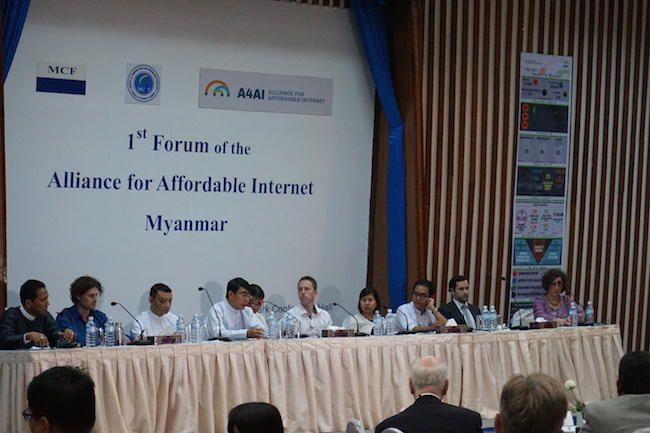
A4AI recently kicked off its activities in Myanmar — where hopes and expectations are high for the government and telecom operators to deliver Internet access as widely and quickly as possible.
On March 26, the Alliance hosted a forum that brought together more than 75 of the country’s influential stakeholders from the government, private sector, and civil society. The forum provided participants an opportunity to discuss openly and identify the biggest challenges to expanding affordable Internet access in a country where only 15 percent of the population use the Internet — up from a 2013 use rate of just over 1 percent.
It was only two years ago, in 2013, that Myanmar opened its telecoms sector to market competition. Despite the numerous obstacles facing Myanmar as it works to meet demand and expand access to broadband across the country, the country also has the unique advantage of being able to “sit on the shoulder of giants” and to learn from the experiences of other countries in order to “shortcut and leapfrog obstacles” on the road to affordable Internet, said H.E. U Thaung Tin, Deputy Minister of Communication and Information Technology.
Challenges to expanding access
During the forum, representatives from private sector organisations, including operators Telenor and Ooredoo, government departments such as the Myanmar Computer Federation and the country’s telecoms regulator, and civil society organisations such as the Myanmar ICT for Development Organisation, highlighted the biggest obstacles they face in expanding Internet access. These include:
- Expanding broadband coverage across a large and diverse geographical area, including in many areas where it may not commercially viable for providers to operate;
- Expanding networks to the approximately 70 percent of the population that live in rural areas, often without electrical power;
- Lack of coordination among operators and regional and local authorities, in addition to a lack of streamlined processes for rolling out telecoms networks and building necessary infrastructure;
- Emphasis on mobile broadband expansion resulting in little focus on the development of fixed-line broadband infrastructure, which is vital for businesses and entrepreneurs;
- Lack of public awareness on the benefits of using the Internet and ICTs in general;
- Lack of available local content, especially in ethnic languages;
- General lack of ICT data and formal processes to collect such data; and
- Lack of staff and institutional capacity to address the policy and regulatory needs of a fast-growing sector, including an independent regulatory agency that has not yet been fully set up.
Deputy Minister U Thaung Tin stressed that the government is facing immense political pressure from parliament and citizens to expand Internet access to as many people as possible, as quickly as possible. He shared his hope that Myanmar’s partnership with A4AI will allow the country to learn from the successes and failures of other countries, and ensure that the policies and regulations necessary for expanding affordable Internet are developed with the input of all of Myanmar’s stakeholders.
Developing the coalition’s plan of action
After an open debate surrounding the primary challenges to affordable Internet in Myanmar, forum participants determined that the A4AI-Myanmar Coalition should prioritise and focus on tackling the following issues:
- Infrastructure Sharing and Deployment
- Taxation
- Universal Service Fund Administration
- Data Collection & Research Framework
In the coming months, working groups will be formed to work through each of these priority areas. Each working group will develop a work plan outlining concrete activities and outputs (e.g., policy proposals, regulatory frameworks, campaigns to raise awareness, etc.) that it will strive to implement, with the support of A4AI. A4AI is also planning a series of capacity-building workshops, which will aim to increase coalition member knowledge about key priority areas and ability to contribute to the decision making process. The next coalition meeting — which is tentatively scheduled for early July— will be an opportunity for the working groups to meet in person and develop their work plans. The A4AI-Myanmar Coalition has the opportunity to support the development of an innovative policy and regulatory framework that is forward-looking and fully aligned with the goals of the Information Society.
Comments are closed.
